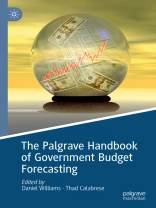This Handbook is a comprehensive anthology of up-to-date chapters contributed by current researchers in budget forecasting. Editors Daniel Williams and Thad Calabrese had previously found substantial deficiencies in public budgeting forecast literature with current research failing to address such matters as practices related to forecasting expenditure factors, the consequences of forecast bias, or empirical examination of the effectiveness of many deterministic methods actually used by many governments. This volume comprehensively addresses the state of knowledge about budget forecasting for practitioners, academics, and students and serves as a comprehensive resource for instruction alongside serving as a reference book for those engaged in budget forecasting practice.
Tabela de Conteúdo
1. Introduction- Daniel W. Williams and Thad Calabrese.- Part I: International and National.- 2. Macroeconomic Theory & Forecasting- Gerald D. Cohen.- 3. Evaluation of Budget Forecasts- Neil R. Ericcson and Andrew B. Martinez.- 4. Budget Preparation and Forecasting in the Federal Republic of Germany- Dörte Busch and Wolfgang Strehl.- 5. Revenue Forecasting in Low-Income and Developing Countries: Biases and Potential Remedies- Marco Cangiano and Rahul Pathak.- 6. The Reliability of Long-Run Budget Projections- Rudolph Penner.- 7. CBO Updated Forecasts: Do a Few Months Matter?- James W. Douglas and Ringa Raudla.- Part II: State and Local.- 8. State Revenue Forecasting Practices: Accuracy, Transparency, and Political Participation- Emily Franklin, Carolyn Bourdeaux, and Alex Hathaway.- 9. Modeling and Forecasting State Tax Revenue since the Great Recession- Melissa Mc Shea and Joseph Cordes.- 10. Bias Associated with Centrally Budgeted Expenditure Forecasts- Thad Calabrese and Daniel W. Williams.- 11. Excessive Revenue Underforecasting: Evidence and Implications from New York City’s Property Tax- Geoffrey Propheter.- 12. Small Local Government Revenue Forecasting- Vincent Reitano.- 13. Current Midyear Municipal Budget Forecast Accuracy- Daniel W. Williams and Thad Calabrese.- Part III: Subject Matter Specialties.- 14. Using Fiscal Indicator Systems to Predict Municipal Bankruptcies- Jonathan B. Justice, Marc Fudge, Helisse Levine, David D. Bird, and Muhammad Naveed Iftikhar.- 15. School District Enrollment Projections and Budget Forecasting- Peter Jones, Carl Rakow, and Vincent Reitano.- 16. Budget Uncertainty and the Quality of Nonprofit Charter School Enrollment Projections- Todd L. Ely.- 17. Forecasting for Prisons and Jails- Bruce D. Mc Donald III, J. Winn Decker, and Mathew Hunt.- 18. Government and Nonprofit Personnel Forecasting- Vincent Reitano.- 19. Forecast Bias and Capital Reserves Accumulation- Vincent Reitano, Peter Jones, Nathan Barrett, and Jacob Fowles.- 20. Consensus Forecasting- J. Winn Decker and Bruce D. Mc Donald III.- 21. Ensemble Forecasting- Kenneth Kriz.- Part IV: Conclusion.- 22. Conclusion- Daniel W. Williams and Thad Calabrese.
Sobre o autor
Daniel Williams has been with Baruch College since 1995 where he teaches budgeting, performance measurement, and ethics. Prior, he was the budget director for the Virginia Department of Medical Assistance Services (Medicaid) for a decade where he was responsible for the Medicaid expenditure forecast. Williams has 18 academic publications related to forecasting ranging from methodology to empirical evaluation of forecasts and including two textbooks.
Thad Calabrese is an Associate Professor of Public and Nonprofit Financial Management at New York University. He studies public and nonprofit financial management, broadly focusing on the management and governance of public and not-for-profit organizations, as well as the institutions that affect managerial decision-making in these entities. Prior to working in academia, Thad worked in the New York City Office of Management and Budget in the Tax Policy and Forecasting Unit where he forecast the property tax, its various components, and other related taxes.












